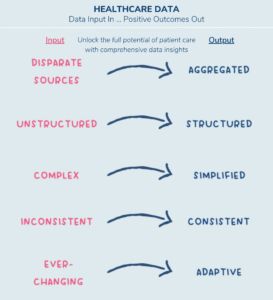How Predictive Data Improves Outcomes, Cuts Costs
This article is one in a series that advocates the need to bring specialty care under value-based care payment models. Click here to read the previous article, How Insights from Payer Data Improve Patient Care.
As much as 30% of data worldwide is generated by the healthcare industry. That percentage is expected to rise to 36% in the next three years, according to a recent report by RBC Capital Markets.
Yes, there’s a lot of information out there—enough, The Financial Times reported, to advance discoveries and ignite a healthcare revolution. This is great news for every party involved—patients, providers, and payers alike. From wellness to prevention to treatment, all that data has the power to transform the lives of us all.
Better Health at Lower Cost: Data-Driven Value-Based Care Is Key
The promise of improved healthcare outcomes, more cost-effective care, and longer lives depends on our ability to harness the vast amounts of data out there. When those who provide care—primary-care physicians and specialists alike—have access to aggregated information across the board, they become empowered.
- That data, all in one place, provides information transparency that results in the insight needed to help patients get well and stay healthy.
- It enables providers to deliver a higher quality of healthcare more economically than ever before possible.
- Plus, it puts payers in a position to incentivize positive outcomes and cost containment.
Data-driven, predictive healthcare is essential to better futures for us all.
Digital Tools Bring VBC Benefits to Bear
A recent article published on the World Economic Forum notes that new digital tools can help providers prevent, predict, and treat healthcare issues in a highly personalized way. How? By bringing disparate data together, safely, to make the healthcare decisions that improve outcomes and cut costs.
So far, the benefits of digital healthcare—putting to use the almost one-third of the data in the world—has been for the most part unrealized.
There is however one organization out there that is making real strides: Enlace Health. Enlace is solving the problem of how to access digital healthcare data to better take care of patients—and how to do it in a way that is safe and trustworthy.
To succeed takes an approach that recognizes that information sharing is in everybody’s best interest—patients, providers, and payers. It is possible to share, and reap benefit, in a way that doesn’t compromise privacy.
Enlace’s technology and processes are aggregating patient and provider information from a vast array of sources and systems, so physicians can provide personalized care plans based on real-world experiences of literally hundreds of millions of other individuals.
Aggregated data from patients around the world gives every single doctor a better understanding of the individual sitting in their exam room right now. That information is critical to a care provider’s ability to provide timely, evidence-based care at lower cost. By leveraging patient data across the board, patient outcomes are better across the board.

Out With the Status Quo, In With Value-Based Care
Aging technology, outdated business models, and decaying infrastructure are the norm now. But on the horizon are better ways to give and receive healthcare.
Making it easier to share, store, and merge data … promoting interoperability … is what it takes now to give patients and providers the optimal experiences we all need.
This article is one in a series that advocates the need to bring specialty care under value-based care payment models. Click here to read the next article, Primary Care and Specialty Care Work Better Together.
References
Why we need to unlock health data to beat disease
Big Tech jockeys for position in scramble for health data primacy
 ASK ENLACE
ASK ENLACE